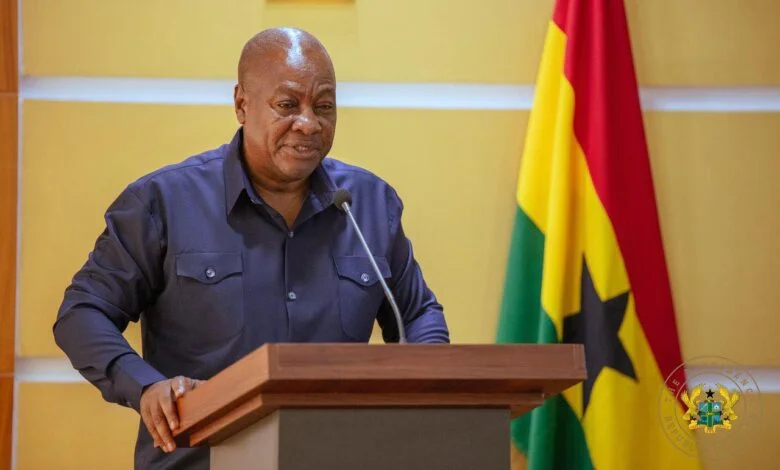Amidst urgent call for action.
President John Dramani Mahama has forcefully asserted that agribusiness is the indisputable future of Ghana’s economy, demanding immediate and unified efforts to transform the sector into a powerhouse for industrial growth, job creation, and export diversification.
His declaration came at the inaugural National Agribusiness Dialogue in Accra on July 28, 2025, which he hailed as a “vital turning point” for the nation’s economic trajectory.
Mahama lauded the Ministry of Trade, Agribusiness and Industry for orchestrating the dialogue and spearheading a critical policy realignment. This strategic move, he explained, aims to transition Ghana from a predominantly agrarian economy to a competitive, export-led industrial hub.
“Today’s dialogue is not just another meeting. It is a call to action. We must move from talking to implementation,” President Mahama declared, emphasizing the urgency to unlock the full potential of agribusiness as the new driver of Ghana’s inclusive and sustainable industrial growth.
INFRASTRUCTURE, GLOBAL OPPORTUNITIES, AND AMBITIOUS INITIATIVES
The President underscored the critical need for developing infrastructure and food production corridors, particularly in Ghana’s northeastern regions, to ensure seamless transportation of agricultural products.
He highlighted the immense opportunity presented by the projected growth in the global agribusiness market, positioning Ghana, with its vast arable land, abundant water, and youthful population, as a potential key player in global food systems.
Mahama stressed the imperative of value addition, integration into global value chains, and robust local supply systems to seize this opportunity.
To this end, President Mahama unveiled a suite of ambitious initiatives, including the Keep the Industries Initiative, Rapid Industrialization Initiative, and the Accelerated Export Development Programme, all designed to propel the 24-hour economy agenda.
These programs, he noted, hinge on the year-round availability of raw materials, necessitating a shift from seasonal farming to continuous agriculture supported by expanded irrigation and mechanization.
FEEDING THE FUTURE: THE AGRIBUSINESS PILLARS
A cornerstone of the President’s address was the launch of the Feed Industry Programme, built on four strategic pillars: Commercial Farmer Development, Post-harvest Loss Solution Centers, Industrial and Market Development, and Institutional Capacity Building.
Mahama expressed confidence that these pillars would significantly boost Ghana’s industrial capacity utilization from the current 30-40% to an impressive 70-80%.
In a move to bolster local content, the government is compiling a comprehensive list of agro-processed products manufactured in Ghana to guide procurement and promote indigenous consumption.
Furthermore, a National Agribusiness Policy is in the works, designed to provide strategic direction for investment and coordination across the entire agribusiness ecosystem, with a focus on value addition, competitiveness, processing standards, and supply chain resilience.
A COLLECTIVE CALL TO ACTION
In his closing remarks, President Mahama issued a direct challenge to all stakeholders: “We must each ask ourselves: What can I do for agribusiness? Let us approach this journey with commitment to inclusive growth, sustainability, and a passion to see Ghana rise through agribusiness.”
MINISTRY’S VISION AND EXPERT INSIGHTS
Welcoming participants, the Minister for Trade, Agribusiness and Industry, Hon. Elizabeth Ofosu-Adjare (MP), commended President Mahama’s steadfast leadership, affirming that her Ministry’s expanded mandate signals a pivotal shift in policy direction.
“We are here today because we recognise that Ghana’s agribusiness sector must move beyond its traditional confines,” she stated, emphasizing the need to embrace innovation, invest in value addition, scale up agritech solutions, strengthen market systems, and expand access to finance.
Minister Ofosu-Adjare also highlighted the government’s 24-Hour Economy Policy as a strategic tool to amplify agribusiness development, particularly in agro-processing, logistics, and market access.
“By creating the conditions for round-the-clock productivity, we can unlock new layers of efficiency, reduce post-harvest losses, and drive continuous value addition,” she added.
BEYOND PILOT PROJECTS: A BOLD SHIFT NEEDED
Mr. Daniel Fahene Acquaye, Group CEO of Agri Impact Limited and Guest Speaker, delivered a stark assessment of Ghana’s agribusiness sector, stressing its untapped potential and the urgent need for strategic scale-up.
He called for a bold shift from pilot projects and small-scale interventions to large-scale agribusiness investments that can drive genuine transformation.
Citing South Africa’s agro-processing sector, which contributes significantly more to GDP than its primary agriculture, Acquaye urged Ghana to rethink its strategy, noting that agro-processing currently accounts for just 6% of Ghana’s GDP, compared to 20-26% from primary agriculture.
To reverse this, he proposed the establishment of a dedicated Agri Fund to unlock financing, strengthen value chains, and support the development of indigenous champions.
He further highlighted the need for improved agro-processing infrastructure, especially in the northern regions, and called for the creation of agro-industrial hubs with modern logistics and digital tools.
The event culminated with the declaration of the launch of the 2025 National Agribusiness Dialogue, signaling a new era for agribusiness policy, strategy, and implementation in Ghana.
By Philip Antoh


